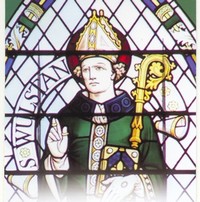- Jun 9, 2010
- 11,093
- 6,889
- Country
- United Kingdom
- Faith
- Catholic
- Marital Status
- Single
- Politics
- UK - SNP
St Wulfstan

Benedictine monk and bishop of Worcester , England , St Wulfstan was born of Anglo Saxon parents in 1008 at Itchington in Warwickshire. Educated at the abbeys of Evesham and Peterborough, he excelled in piety and sport.
After he was ordained priest he was offered a richly endowed church but refused it. Instead he became a Benedictine monk at Worcester cathedral priory. He soon became master of the boys, cantor and sacristan. In 1050 he was made prior and set about reorganising the community. He was known for his gifts as a preacher and counsellor.
In 1062 the Pope gave special permission for him to become bishop of Worcester. St Wulfstan is considered one of the best examples of combining effectively the tasks of monastic superior and diocesan bishop. He is the first bishop known to have made systematic visits throughout his diocese. He encouraged lay lords to build chapels on their land and insisted on the use of stone rather than wooden altars. He rebuilt the cathedral, and took his full share of daily services.
During his office Worcester became one of the most important centres of literature and culture. St Wulfstan was known for his kindness and generosity to the poor. One of his important achievement was the abolition of the trade in slaves from Bristol to Viking Ireland, through persistently preaching in the subject.
When William the Conqueror invaded in 1066, he submitted to Norman rule. He died in 1095, at the age of 87, a venerable survivor of a past age. After his death, his cult began to grow almost immediately with cures reported at his tomb. He was made a saint in 1203.
- Celebrated on January 19th

Benedictine monk and bishop of Worcester , England , St Wulfstan was born of Anglo Saxon parents in 1008 at Itchington in Warwickshire. Educated at the abbeys of Evesham and Peterborough, he excelled in piety and sport.
After he was ordained priest he was offered a richly endowed church but refused it. Instead he became a Benedictine monk at Worcester cathedral priory. He soon became master of the boys, cantor and sacristan. In 1050 he was made prior and set about reorganising the community. He was known for his gifts as a preacher and counsellor.
In 1062 the Pope gave special permission for him to become bishop of Worcester. St Wulfstan is considered one of the best examples of combining effectively the tasks of monastic superior and diocesan bishop. He is the first bishop known to have made systematic visits throughout his diocese. He encouraged lay lords to build chapels on their land and insisted on the use of stone rather than wooden altars. He rebuilt the cathedral, and took his full share of daily services.
During his office Worcester became one of the most important centres of literature and culture. St Wulfstan was known for his kindness and generosity to the poor. One of his important achievement was the abolition of the trade in slaves from Bristol to Viking Ireland, through persistently preaching in the subject.
When William the Conqueror invaded in 1066, he submitted to Norman rule. He died in 1095, at the age of 87, a venerable survivor of a past age. After his death, his cult began to grow almost immediately with cures reported at his tomb. He was made a saint in 1203.
